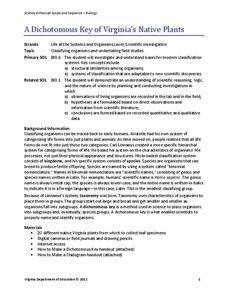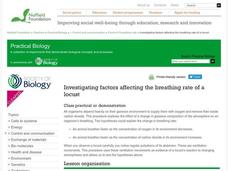Prince William Network
Migration Headache
During this game, kids become migratory shorebirds and fly among wintering, nesting, and stopover habitats. If they do not arrive at a suitable habitat on time, they do not survive. Catastrophic events are periodically introduced that...
Royal Society of Chemistry
Green Plastics—Chemistry Outreach
How do green plastics reduce waste and environmental pollution? Budding scientists create and test a variety of compounds used in green plastics during an insightful experiment. Beginning with startling statistics and ending with...
Baylor College
Needs of Plants
What better way to learn about plant life than by creating a class garden? Young botanists start with a brief discussion about radishes before planting seeds and watching them grow. To determine the importance of water, sunlight, and...
Odell Education
Scientific Process and Experimental Design
The scientific method keeps you from believing only what you want to believe — it expands your mind. The lesson introduces the eight steps in the scientific process and how to design an experiment to biology scholars. Live insects...
Beyond Benign
Ecological Footprint
How does your lifestyle measure up in terms of your ecological footprint? Young ecologists examine their impact on the planet using an insightful online calculator. A short quiz asks users to rank the size of their homes, their energy...
Curated OER
Microbes
Sometimes the tiniest things can affect our daily lives. Learn all about the wonders of microbes. This excellent resource provides information on the types of microbes found in our environment, what they look like, and how they impact us...
Virginia Department of Education
A Dichotomous Key of Virginia’s Native Plants
Can your class correctly classify plant species? Individuals explore native plants of the local environment and correctly classify them into their respective categories. They investigate differences in the plants and discuss similarities...
Curated OER
The Giver: Lesson 1
Do “memories need to be shared?" Are “memories…forever?" Would you give up memory to live in a perfect world? Introduce a unit centered on Lois Lowry’s utopian/dystopian novel The Giver with a series of activities that has groups...
Curated OER
Pond Life
Students explore pond ecosystems. In this living environment lesson, students observe the local pond and identify the living things they find by drawing pictures. Students observe organisms that were found in the pond by using a...
Curated OER
Brine Shrimp Life Cycle
Third graders examine brine shrimp through "A Sea Monkey's Life" story. They study the living environments and life cycle of brine shrimp. They look at brine shrimp and cysts through a microscope, identifying new vocabulary that was...
Curated OER
Not So Neutral Views
Students explore ways to use indicators to distinguish between acids and bases. They conduct an experiment to model and discuss the harmful effect of acid rain in our living and non-living environment.
Curated OER
Food Chains and Food Webs
Fourth graders investigate food chains. In this living environment lesson, 4th graders begin to understand the interdependence of organisms. Students describe the connections organisms have to the ecosystem. Students research online,...
Curated OER
DIVERSE ENVIRONMENTS
Third graders list examples of the diverse life forms that live in different environments, such as oceans, deserts, tundra, forests, grasslands and wetlands.
Curated OER
Environmental Changes
High school scientists reasearch and illustrate changes in the local environment and consider relationships among agriculture, industry, economy, natural events, and social interactions. They construct a timeline to discover if there are...
Environmental Protection Agency (EPA)
Teachers' Guide to Using A Day In the Life of a Drop
Hydrology hopefuls learn about their local watershed. Through discussion and online interactives, they see that their habits affect the water supply. The activity concludes with a pledge to filter out bad water usage habits. It makes a...
Curated OER
Treasures in Jeopardy
In small groups, middle schoolers research deep-sea coral reefs and design a poster to educate the public about their importance. They compare them to shallow-water reefs and consider the impact of bottom-trawl fishing. Many internet...
Curated OER
What Makes Up an Environment?
In this environment worksheet, students complete a graphic organizer by filling in the blanks of statements describing different animal adaptations.
Curated OER
Plants and Animals
Seventh graders discover the interconnectedness of plants and animals in ecosystems. In groups, they create a food web and discuss the problems when one link of the chain is broken. To end the lesson, they set up a balanced environment...
Curated OER
Animals Must Fit In
A instructional activity on tadpoles is here for your young biologists. Learners read a short paragraph on tadpoles, then answer three questions regarding how parts of their bodies help the tadpole to survive in the pond. There is a good...
Curated OER
Disguise for the Eyes
Young scientists discover how many, many animals use color as a way of helping them to survive in the wild. They understand how animals use color in their everyday lives. Pupils engage in hands-on activities, watch videos, access...
Curated OER
Animal Homes
Match animals to their environments with a cute lab activity. Kids draw a line between each animal, such as a fish, a rabbit, and an ant, to the place where it lives. For hands-on practice, a science investigation instructs learners to...
Sea World
Endangered Species
Study different endangered species with several activities that incorporate math, science, language arts, and research strategies. A great addition to your lesson on conservation or Earth Day.
Nuffield Foundation
Investigating Factors Affecting the Breathing Rate of a Locust
Do animals breathe faster when given more oxygen or more carbon dioxide? Young scientists observe the respiration rates of locusts under a variety of gas concentrations to answer that very question. They collect data, analyze the...
Curated OER
A Photosynthesis Timeline
Science learners discover that scientific advancements come in increments. Beginning as an idea, changes and developments are influenced by available resources and current societal values. As an example, pupils examine the conclusions...

























